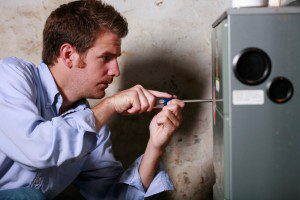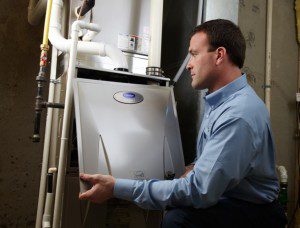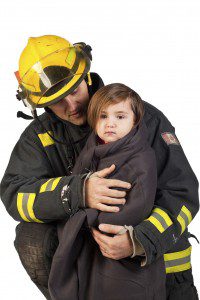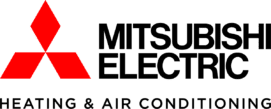I’ve already seen pumpkin spice lattes offered on coffee shop menus so it must be time to send out the CPS technicians for furnace tune-ups.
For me, September still holds a few more beach days. From Westborough, it’s a short trip down I-495 to Cape Cod, and there’s slightly less traffic going over the Bourne Bridge once school starts.
Even though snow is far from my mind, I encourage customers to think about heating their homes in winter. To help them out, I put together a to-do list of Insider Tricks for Reducing Your Utility Bill.
Now, I’m going to dig into one task on that list: gas furnace tune-ups. There’s nothing worse than turning on your heat the first cold night to have your furnace motor kick on and then shut off.
If you’re a business owner, a broken furnace can cost you money, customers, and you’re reputation.
I don’t recommend performing a gas furnace tune-up yourself, and you may think that’s obvious because I’m an HVAC contractor.
STOP: Don’t underestimate manufacturer training and years of on-the-job HVAC experience. It’s always a good idea to use a professional when working with natural gas. Small leaks and other tell-tale signs of future problems may not be obvious to the average handyman, and the consequences can be catastrophic.
To help you understand the benefits of a furnace tune-up, here’s my Furnace Tune-up Checklist:
1. Inspect and clean the combustion chamber.
All electricity and gas needs to be turned off before accessing the inside of your furnace.
STOP: If you’re not comfortable turning off power from the circuit breaker or safely turning on and off your natural gas, call a professional.
The inside of the combustion chamber should be vacuumed out and inspected for holes created by corrosion, according to home improvement expert Bob Vila.
2. Inspect ignition system and assembly.
While you’re in the combustion chamber, take a look at the ignition system. Unless you have an older furnace, there won’t be a standing pilot light on. Modern furnaces typically have two types of ignition systems: intermittent pilot (IP) and hot surface ignitors (HSI) systems.
IP systems ignite the gas burner with a spark only when the thermostat calls for heat.
The more common HIS systems use hot surface ignitors, which are like filament light bulbs, to ignite the gas burner when heat is needed.
Knowing which furnace you have is critical to identify signs of a future repair and troubleshoot gas furnaces problems.
STOP: If you have an older furnace, there’s probably two motor bearings that need machine oil. Bob Vila suggests wiping the caps first, then removing them to apply the oil.
3. Inspect and clean the blower compartment.
As you did with the combustion chamber, vacuum the blower compartment and look for holes, Bob Vila says.
Foil tape can be used to patch holes in the combustion chamber and blower compartment, as well as anywhere else along the ductwork you spot a place for a potential leak.
STOP: Older furnaces that have motor bearings will also have two blower-shaft bearings. Wipe and remove the caps, and then add machine oil.
4. Change the air filter.
During heating season, most experts recommend inspecting the air filter every one to three months and changing it as needed. This simple yet critical part of the furnace not only protects the machine from dirt and debris, but it also removes the pollution from the air you breathe. More sophisticated air filters can even clean and kill bacteria, mold, and viruses from your indoor air.
STOP: Neglecting to change the air filter can ruin your gas furnace. Clogged air filters make the motors work harder than necessary to move the air through the system. As a result, the machinery is stressed, which leads to costly repairs, and the furnace runs inefficiently, which adds up to higher fuel costs.
5. Test for carbon monoxide emissions.
Carbon monoxide (CO) is an invisible, odorless, and poisonous gas. It kills hundreds of people every year and sickens thousands more, according to the Centers for Disease Control and Prevention (CDC).
Oil and gas furnaces should be inspected for leaks once a year, the CDC suggests.
Plus, a battery-operated or battery back-up CO detector should be near every sleeping area in your home, as well as near the gas furnace.
STOP: Today, you can get a combination smoke and CO detector. Don’t forget to test the detectors each month, change the batteries every year, and replace the entire unit every 10 years, according to the U.S. Fire Administration.
6. Check and calibrate the thermostat.
Testing the accuracy of your thermostat can be as simple as placing a reliable thermometer in the room and comparing its reading to your thermostat setting.
Calibrating your thermostat can be tricky.
Move the lever awayfrom the “longer” setting if the furnace cycles on and off too often, and move the lever towardsthe “longer” setting if the room temperature is too hot or too cold for long periods, according to The Family Handymanmagazine.
Digital and smart thermostats can be uniquely adjusted electronically as described in the manufacturer’s instructions.
Wrap-up:
 The time to prepare for emergencies is before they happen, I like to say. Have your gas furnace heating system inspected annuallyto ensure the safety and well-being of your family.
The time to prepare for emergencies is before they happen, I like to say. Have your gas furnace heating system inspected annuallyto ensure the safety and well-being of your family.
In addition, factory-trained HVAC technicians can keep your gas furnace performing at optimal efficiency so you can save money on yearly energy costs, as well as getthe best return on your long-term investmentin a new, energy-efficient gas furnace.
As for me, I’ll keep drinking my iced lattes for a few more weeks.
Phil
CPS Heating and Cooling
You can always call on your extended family of dependable heating, cooling, and air quality experts at CPS Heating & Cooling.
Contact us anytime to set up a consultationor call us at 508-460-6691.



![Energy-efficient gas furnaces should never be installed by anyone but a fully insured HVAC technician.]](https://cpshvac.com/wp-content/uploads/2019/08/11002014538-300x240.jpg)




